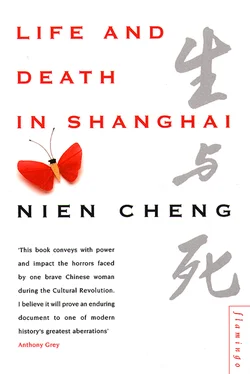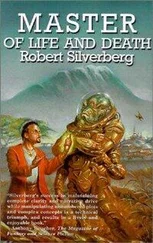Another Red Guard said, ‘The purpose of the Great Proletarian Cultural Revolution is to destroy the old culture. You cannot stop us!’
I was trembling with anxiety and frantically searching my mind for some convincing argument to stop this senseless destruction. But before I could utter another futile word, I saw another young man coming down the stairs from the third floor with my Blanc de Chine Goddess of Mercy, Kwan Yin, in his hand. I turned to him and asked uneasily, ‘What are you going to do with that figure?’
He swung his arm holding the Kwan Yin carelessly in the air and declared, ‘This is a figure of Buddhist superstition. I’m going to throw it into the dustbin.’
The Kwan Yin was a perfect specimen and a genuine product of the Têh Hua kiln in Fukien province. It was the work of the famous seventeenth-century Ming sculptor Chen Wei and bore his seal on the back of the figure. The beauty of the creamy-white figure was beyond description. The serene expression of the face was so skilfully captured that it seemed to be alive. The folds of the robe flowed so naturally that one forgot it was carved out of hard biscuit. The glaze was so rich and creamy that the whole figure looked as if it were soft to the touch. This figure of Kwan Yin I always kept in its padded box, deeming it too valuable to be displayed. I took it out only when knowledgeable friends interested in porcelain asked to look at it.
‘No, no, please! You mustn’t do that! I beg you.’ I was so agitated that my voice was shrill. The Red Guard just fixed me with a stony stare and continued to swing his arm casually, holding the Kwan Yin now with only two fingers.
Pleading was not going to move the Red Guards. If I wanted to communicate, I must speak their language. The time had come to employ diplomacy, it seemed to me. If the Red Guards thought I opposed them, I would never succeed in saving the treasures. By this time, I no longer thought of them as my own possessions. I did not care to whom they were to belong after tonight as long as they would be saved from destruction.
‘Please, Red Guards! Believe me, I’m not opposed to you. You have come here as representatives of our Great Leader. How could I oppose the representatives of Chairman Mao? I understand the purpose of the Cultural Revolution. Did I not surrender the keys willingly when you asked for them?’ I said.
‘Yes, you did that,’ conceded the teacher with a nod. The Red Guards gathered around us seemed to relax a little.
Somewhat encouraged, I went on, ‘All these old things belong to the past era. The past is old. It must go to make way for the new culture of socialism. But they could be taken away without immediate destruction. Remember, they were not made by members of the capitalist class. They were made by the hands of the workers of a bygone age. Should you not respect the labour of those workers?’
A Red Guard at the back of the group shouted impatiently, ‘Don’t listen to her flowery words. She is trying to confuse us. She is trying to protect her possessions.’
I quickly turned to him and said, ‘No, no! Your being in my house has already improved my socialist awareness. It was wrong of me to have kept all these beautiful and valuable things to myself. They rightly belong to the people. I beg you to take them to the Shanghai Museum. You can consult their experts. If the experts advise you to destroy them, there will still be time to do so.’
A girl said, ‘The Shanghai Museum is closed. The experts there are being investigated. Some of them are also class enemies. In any case, they are intellectuals. Our Great Leader has said, “The capitalist class is the skin; the intellectuals are the hairs that grow on the skin. When the skin dies, there will be no hair.” The capitalist class nourishes the intellectuals, so they belong to the same side. Now we are going to destroy the capitalist class. Naturally the intellectuals are to be destroyed too.’
The quotation of Mao she mentioned was new to me, but this was no time to think of that. I pursued my purpose by saying, ‘In that case, consult someone you can trust, someone in a position of authority. Perhaps one of the Vice-Mayors of Shanghai. Surely there are many private collections in the city. There must be some sort of policy for dealing with them.’
‘No, no! You are a stupid class enemy! You simply do not understand. You are arguing and advising us to consult either other class enemies or the revisionist officials of the government. You talk about official policy. The only valid official policy is in this book.’ The young man took his book of Mao’s quotations from his pocket and held it up as he continued, ‘The teachings of our Great Leader Chairman Mao is the only valid official policy.’
Changing the direction of my argument, I said, ‘I saw a placard saying, “Long Live World Revolution.” You are going to carry the red flag of our Great Leader Chairman Mao all over the world, aren’t you ?’
‘Of course we are! What has that got to do with you? You are only a class enemy,’ a girl sneered. She turned to the others and warned, ‘She is a tricky woman. Don’t listen to her nonsense!’
Getting really desperate, I said, ‘Don’t you realize all these things are extremely valuable? They can be sold in Hong Kong for a large sum of money. You will be able to finance your world revolution with that money.’
At last, what I said made an impression. The Red Guards were listening. The wonderful prospect of playing a heroic role on the broad world stage was flattering to their ego, especially now they were getting intoxicated with a sense of power.
I seized the psychological moment and went on. ‘Please put all these porcelain pieces back in their boxes and take them to a safe place. You can sell them or give them to the Museum, whatever you consider right, according to the teachings of our Great Leader.’
Perhaps, being an older person, the teacher felt some sense of responsibility. She asked me, ‘Are you sure your collection is valuable? How much would you say they are worth?’
‘You will find a notebook with the date of purchase and the sum of money I spent on each item. Their price increases every month, especially on the world market. As a rough estimate, I think they are worth at least a million yuan,’ I told her.
Although members of the proletarian class did not appreciate value, they understood price. The Red Guards were impressed by the figure ‘one million’. The teacher was by now just as anxious as I was to save the treasures, but she was afraid to put herself in the wrong with the Red Guards. However, she found a way for the Red Guards to back down without loss of face.
‘Little Revolutionary Generals! Let’s have a meeting and talk over this matter.’ She was flattering the Red Guards by calling them ‘Little Revolutionary Generals’, a tide coined by the Maoists to encourage the Red Guards to do their bidding. The Red Guards were obviously pleased and readily agreed to her suggestion. She led them down the stairs to the dining room.
I knelt down to pick up the remaining winecups and put them in the box. The Kwan Yin had been left on the table. I took it and carried the pieces upstairs to the large cupboard on the landing of the third floor where I normally kept my collection. I saw that all the boxes had been taken out. On the floor there were fragments of broken pieces of porcelain in colours of oxblood, imperial yellow, celadon green and blue and white. My heart sank at the realization that whatever my desperate effort might now achieve, it was already too late. Many of the boxes were empty.
The third floor rooms resembled a scene after an earthquake except for the absence of corpses. But the red wine spilled out of broken bottles on white sheets and blankets was the same colour as blood.
Читать дальше












